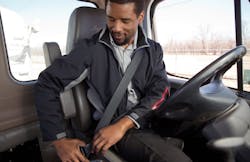Truck passengers: FMCSA wants you to buckle up, too
Passengers in trucks would have to buckle up — and the truck driver and trucking company will be held responsible for them doing so — according to a new proposed rule the Federal Motor Carrier Safety Administration announced Wednesday.
FMCSA announced it is seeking public comment on a Notice of Proposed Rulemaking requiring passengers riding in property-carrying commercial motor vehicles to use safety belts.
Federal rules have long required all commercial drivers to use safety belts (49 CFR 392.16). This proposed rule would hold both trucking companies and commercial truck drivers responsible for ensuring that any passenger riding in the truck cab also are buckled up.
Approximately 275 occupants of large trucks killed in crashes in 2013 were not wearing their safety belts, according to the most recently available data from the National Highway Traffic Safety Administration.
